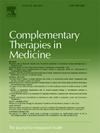Yoga Nidra for cardiovascular health: a systematic review and meta-analysis of between- and within-group effects
IF 3.5
3区 医学
Q1 INTEGRATIVE & COMPLEMENTARY MEDICINE
引用次数: 0
Abstract
Introduction
Cardiovascular diseases remain a leading cause of morbidity and mortality worldwide, with hypertension being a major risk factor. Yoga Nidra (YGN), a guided meditative practice focused on relaxation, has gained attention for its potential cardiovascular effects. Despite this, a clear understanding of YGN’s efficacy remains limited. This systematic review and meta-analysis assessed the effects of YGN on various cardiovascular parameters.
Methods
A comprehensive literature search was conducted across seven academic databases including PubMed, PsycINFO, CINAHL, SPORTDiscus, Scopus, Web of Science, and ProQuest, as well as one trial database, the Cochrane Central Register of Controlled Trials. The methodological quality of the included studies was assessed using the Cochrane Risk of Bias 2 tool for randomized trials and the Downs and Black checklist for non-randomized studies.
Results
A comprehensive literature search across seven databases identified 620 articles, of which 28 met the inclusion criteria for analysis. The quality assessment revealed that most included studies had methodological limitations. The between-group meta-analysis demonstrated significant small-to-large effect improvements in systolic blood pressure (Hedges’ g: −1.65), diastolic blood pressure (−1.01), heart rate (−0.73), and heart rate variability parameters such as low to high frequency ratio (−0.35), when YGN was compared to active control groups. These findings were supported by within-group analyses and leave-one-out sensitivity tests.
Conclusion
The results indicate that YGN practice was associated with improvements in cardiovascular health markers across the analyzed studies. However, the methodological limitations identified in the current literature indicates that high-quality, rigorously designed randomized controlled trials are needed to strengthen the evidence base for YGN’s effectiveness in reducing the risk of cardiovascular diseases.
瑜伽内德拉对心血管健康:组间和组内效应的系统回顾和荟萃分析。
导读:心血管疾病仍然是世界范围内发病率和死亡率的主要原因,高血压是一个主要的危险因素。瑜伽内德拉(YGN)是一种专注于放松的冥想练习,因其潜在的心血管作用而受到关注。尽管如此,对YGN疗效的清晰认识仍然有限。本系统综述和荟萃分析评估了YGN对各种心血管参数的影响。方法:对PubMed、PsycINFO、CINAHL、SPORTDiscus、Scopus、Web of Science和ProQuest等7个学术数据库以及Cochrane中央对照试验注册库进行了全面的文献检索。纳入研究的方法学质量采用随机试验的Cochrane偏倚风险2工具和非随机研究的Downs和Black检查表进行评估。结果:在7个数据库中进行了全面的文献检索,确定了620篇文章,其中28篇符合纳入标准。质量评估显示,大多数纳入的研究在方法学上存在局限性。组间荟萃分析显示,与积极对照组相比,YGN在收缩压(Hedges' g: -1.65)、舒张压(-1.01)、心率(-0.73)和心率变异性参数(如低高频比(-0.35))方面有显著的小到大的改善。这些发现得到了组内分析和留一敏感性测试的支持。结论:结果表明,在分析的研究中,YGN实践与心血管健康指标的改善有关。然而,目前文献中发现的方法学局限性表明,需要高质量,严格设计的随机对照试验来加强YGN降低心血管疾病风险有效性的证据基础。
本文章由计算机程序翻译,如有差异,请以英文原文为准。
求助全文
约1分钟内获得全文
求助全文
来源期刊

Complementary therapies in medicine
医学-全科医学与补充医学
CiteScore
8.60
自引率
2.80%
发文量
101
审稿时长
112 days
期刊介绍:
Complementary Therapies in Medicine is an international, peer-reviewed journal that has considerable appeal to anyone who seeks objective and critical information on complementary therapies or who wishes to deepen their understanding of these approaches. It will be of particular interest to healthcare practitioners including family practitioners, complementary therapists, nurses, and physiotherapists; to academics including social scientists and CAM researchers; to healthcare managers; and to patients. Complementary Therapies in Medicine aims to publish valid, relevant and rigorous research and serious discussion articles with the main purpose of improving healthcare.
 求助内容:
求助内容: 应助结果提醒方式:
应助结果提醒方式:


